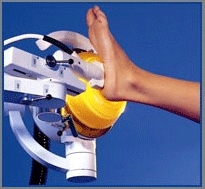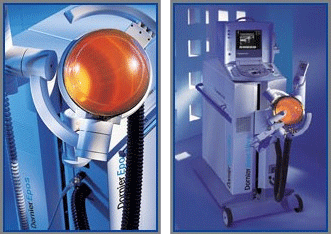What is Extracorporeal Shockwave Therapy (ESWT)?
Shockwave Therapy is known for its use by urologists to treat kidney stones. In October of
How does ESWT work?
Sound waves are applied to the painful area of the heel using an orthopedic shockwave device (as shown).

This
Who would benefit from this new treatment?
People who have suffered from chronic heel pain for at least 6 months and have tried other methods for treating it. Other methods for treatment may include stretching, icing, anti-inflammatory drugs, taping, orthotics, night splints, rest, changes in shoe gear, padding and cortisone injection(s).
What will happen on the day of ESWT?
The treatment is non-invasive; there is no cutting of tissues or skin. Local anesthesia will be administered before the treatment begins. The entire procedure usually takes less than 30 minutes and is performed on an outpatient basis. There is no hospital stay required.
What can I expect after the ESWT treatment?
After a patient is discharged they may experience some discomfort, bruising, and swelling for a few days. The doctor may prescribe a mild pain medication and orthotics. Also, the doctor may tell you to restrict stressful activities, such as running, sports, or carrying heavy loads, for up to four weeks. A
What are the benefits and risks involved with ESWT?
Based on worldwide medical experience, extracorporeal shockwave therapy is a safe and effective alternative to the traditional treatment methods available. There are very few side effects or risks involved in ESWT. The most common patient complaint is some discomfort during and after the treatment. Other side effects include numbness, tingling, reddening or bruising in the treated foot. Some patients will experience pain, which may last from a few days to weeks after the treatment. If you have more questions about the


